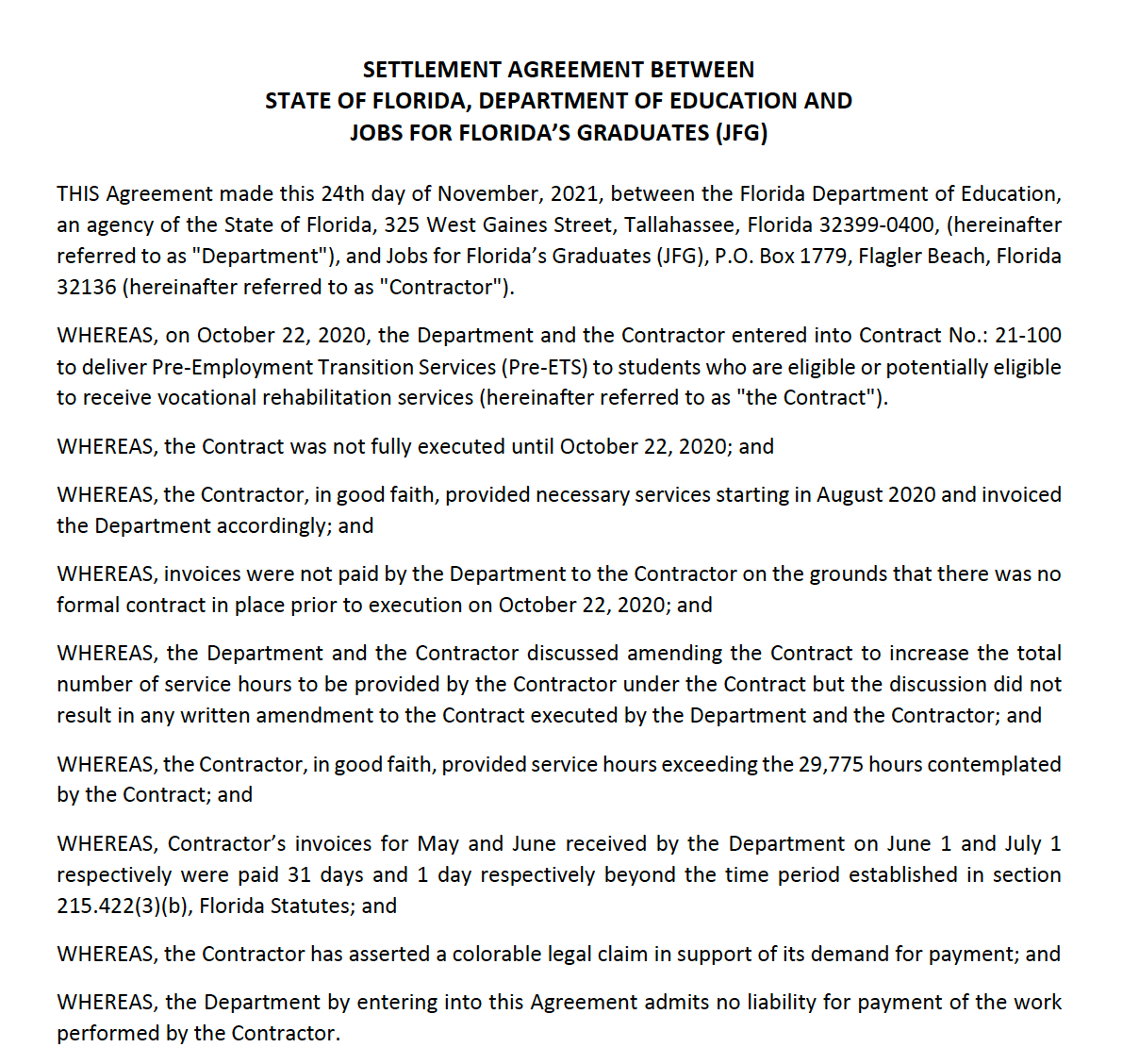Weaponized Bureaucrats Part 4
A behind-the-scenes look at how the DeSantis Administration operates
You can catch up on Parts 1, 2, and 3 below. But, in short, after a routine audit found that “Students served were not in the VR or Student Transition Activities Record (STAR) system in an active status at commencement of services,” the Florida Department of Education took the position that it could not reimburse us for hundreds of hours of service for a total of around $900,000.
FYI - For the purposes of this audit, “students” refers to Floridians (age 14 to 21) who are enrolled in secondary or post-secondary education and who have been diagnosed with a disability.
Here’s how that went down. The contract manager assigned to monitor our contracts was not, in fact, properly monitoring our contracts. Despite having originally misled the auditors, the contract manager ultimately has to admit that his “other duties” left him no time to focus on his responsibilities to review our monthly reports. He was simply approving them. Now, the good news, for us, is that we were able to verify every aspect of those reports. Except one that we viewed as entirely the responsibility of the contract manager and entirely out of our control. The “commencement of service date.”
Even after the audit found that we were 1) submitting compliant reports in a timely fashion and 2) that our contract manager was not adequately monitoring those reports and 3) that my team didn’t have access to any of the VR systems and, therefore couldn’t confirm commencement of services dates - the Division of Vocational Rehabilitation attempted to place the full financial burden on us. Compounding the issue was the fact that this was all after the end of the school year. Those services had been rendered. Staff had been paid. For months we had been dipping into our company reserves while negotiating with the Department. We did that because to do otherwise could have jeopardized the high school graduation of well over one hundred students and the high school course credit of hundreds more. A fact that I repeatedly pointed out to the Florida Department of Education.
In hindsight, I should not have been surprised. Every audit of Vocational Rehabilitation available for review on the Florida Department of Education, Office of Inspector General page includes at least one finding that VR does not provide adequate oversight. But I hadn’t done my research. I didn’t know, for example, when I read headlines about Commissioner Richard Corcoran moving to shut down,” The Able Trust unless it “met 10 demands, which included the resignations of its officers and board of directors, as well as the exit of president and chief executive officer, Susanne Homant, who held the post since 2007,” was based not on funny math or ineptitude as alleged. But was, rather, based on two different interpretations of administrative costs.
Still in the 2019 case of The ABLE Trust in our case two years later, VR’s position remained firm. So, while Susanne Homant fell on her sword, we hired an attorney with a long history in governance. In fact, he co-wrote a book with former Florida Governor and US Senator Bob Graham about fighting City Hall. If you are in the market for a boutique law firm to fight any level of government, look up Hand Law.
Settlement Talks and Sleeplessness Nights
The following months are a blur of three o’clock AM wake-ups, skyrocketing cortisol, dangerous cholesterol levels, and all the things that come with that. Brain fog, irritability, weight gain, and constant worry. It was an unbelievable strain. One you can only fully appreciate if you ever faced a massive organization that is loaded with resources and willing to use them.
The bulk of the stress came from VR’s decision to create this massive spreadsheet in a vacuum. We had no idea where they sourced their data or even the definition of many of the terms they were using. They had no interest in collaborating, leaving it completely up to us to untangle it, decipher it, and offer our corrections back to them. With few exceptions, their answer to our corrected data was “no.” There was never a justification provided for the rejected data.
You can see the confusion in the heading VR created for their spreadsheet. For example, “Referred Date” refers to the date that the student was referred to VR for services. “Referral Date” means the date VR referred the approved student to the service provider (in this case Jobs for Florida’s Graduates). The “Referral Status Date” is the date the service provider agreed to serve the student. As you can see, there is no “commencement of service” date. Confusion permeated the entire process.
The spreadsheet went on to include specific service calculations. The bulk of hours accepted by VR in our favor came from their recognition that they erred in correctly translating minutes of service to hours of service.
In August 2021, FLDOE offered a settlement of a little over $430,000, which I rejected. In November 2021, Commissioner Richard Corcoran and I signed an agreement for around $58,000.
But for the Florida Department of Education, Division of Vocational Rehabilitation it had become personal. And it wasn’t over yet.
Weaponized Bureaucrats Part 3
Okay, so Part II left off with a private meeting between the Senior Chancellor of the Florida Department of Education, the Director of the Division of Vocational Rehabilitation, and the Office of the Inspector General. Whatever was said in that meeting caused Senior Chancellor Eric Hall to pause contract negations with





